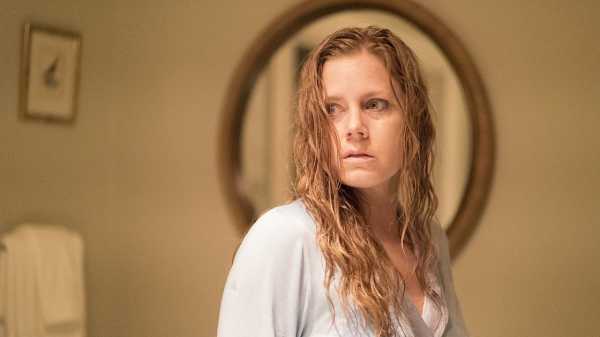
The twist ending of “Sharp Objects” (HBO) is the apex of its elegant, devious design. Until its final moments, the final episode of the miniseries (directed by Jean-Marc Vallée, from a script by the show’s creator, Marti Noxon, and the self-adapting novelist Gillian Flynn) dangles the promise of a soft landing for its rattled protagonist. The heroine was emerging as heroic: Camille Preaker (Amy Adams) had vanquished a monster, rescued a maiden, and composed a clean start at personal salvation. Call me a sap, but I was eager to embrace tidy developments that promised a feel-good conclusion, despite my belief that the show’s excellence as a work of psychological horror is tied up with a steadfast feel-badness. Then, the show snatched the promise away and crushed it. It reverted to form, closing on a gratifying note of festering unease.
To review: Camille had sloughed back to her home town as a newspaper reporter covering the murders of teen-age girls and, also, as a self-harmful alcoholic returning to the scene of crimes against her innocence. Her attempted reckoning with evil and trauma had dragged her through the gutter. In the penultimate episode, she discovers proof that her mother, Adora (Patricia Clarkson), disordered by Munchausen syndrome by proxy, fatally poisoned Camille’s sister. Camille hurtles toward her ancestral home to save her half sister Amma (Eliza Scanlen) from the same doom.
As the finale opens, we see the house through Camille’s eyes—it fills the frame, and wobbles as she unsteadily steps toward a beast that will swallow her. Going undercover as a docile version of herself, Camille submits to Adora’s cracked caregiving. The title of the episode, “Milk,” suggests its interest in the primal business of motherhood; pretending to swoon with illness, Camille cries, “Mama!,” faking helplessness to effect a rescue. She consents to be fed her poisonous home remedy; soon, she is dazed and frail. For a spell, the story itself also seems drugged, or maybe mesmerized.
Throughout the series, Vallée conjures a stifling sense of place. The show’s impressions of thick heat and palpable humidity are only intensified by the frequent presence of mechanical fans, which propel in ambient, rotten wafts of surrealist noir and sultry Southern Gothic. In this scene, fans return, rotating like cycles of violence. Camille settles her head on a pillow, watches a window fan spin, and flashes on a memory from the era of introduction to self-injury: troubled young Camille tips a troubled finger to a whirring blade. Later-life flashes of cutting follow. Cut to the police chief, with his head on his pillow, beneath the still ceiling fan in his bedroom, where the power’s out. This is a signal of disruption of the energy.
Camille struggles around the room in a haze for another day or two. She is collapsed on the ivory floor of her mother’s dressing room, beneath a crystal chandelier with petals evocative of fan blades, when the rotating flash bars of cop cars light up her view. Alerted by Camille’s saintly editor, the police mount a rescue, handcuff Adora, and pin her for the child murders to boot. In less skillful hands, this swift descent of justice would set off sirens of doubt in the viewer’s head. But we’re eager to steer past questions of means and motives, toward the relief of misery, and to land on the friendly shores of storybook resolution.
Amma moves away with Camille and both start life afresh, with Camille radiating a blissful calm in her new role as a mother figure, despite the show’s shrewd skepticism about the transformative power of maternity. Her drinking problem evaporates without a tremor, which ought to be another sign that what we’re seeing is too good to be true to the filthy realism of the show’s general outlook. In the final minute, Camille, poking around Amma’s doll-house replica of the home she mistakenly believes they have escaped, locates a tooth. It’s evidence that Amma is the murderer, and it suggests that Camille is not a savior but an accidental accomplice to wickedness after the fact. It ends with a whimper of impotent agony. Camille looks into her family home, and the roof falls in.
Sourse: newyorker.com






